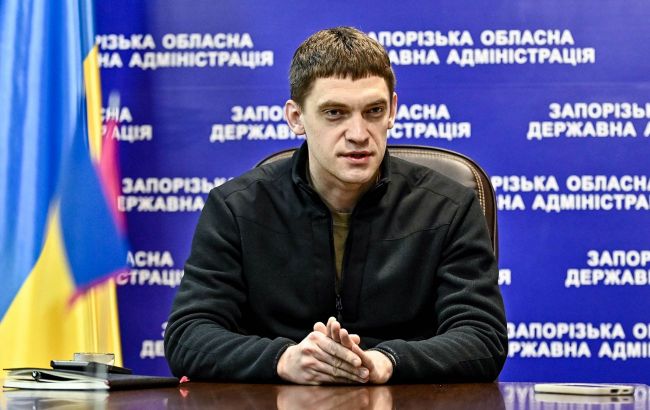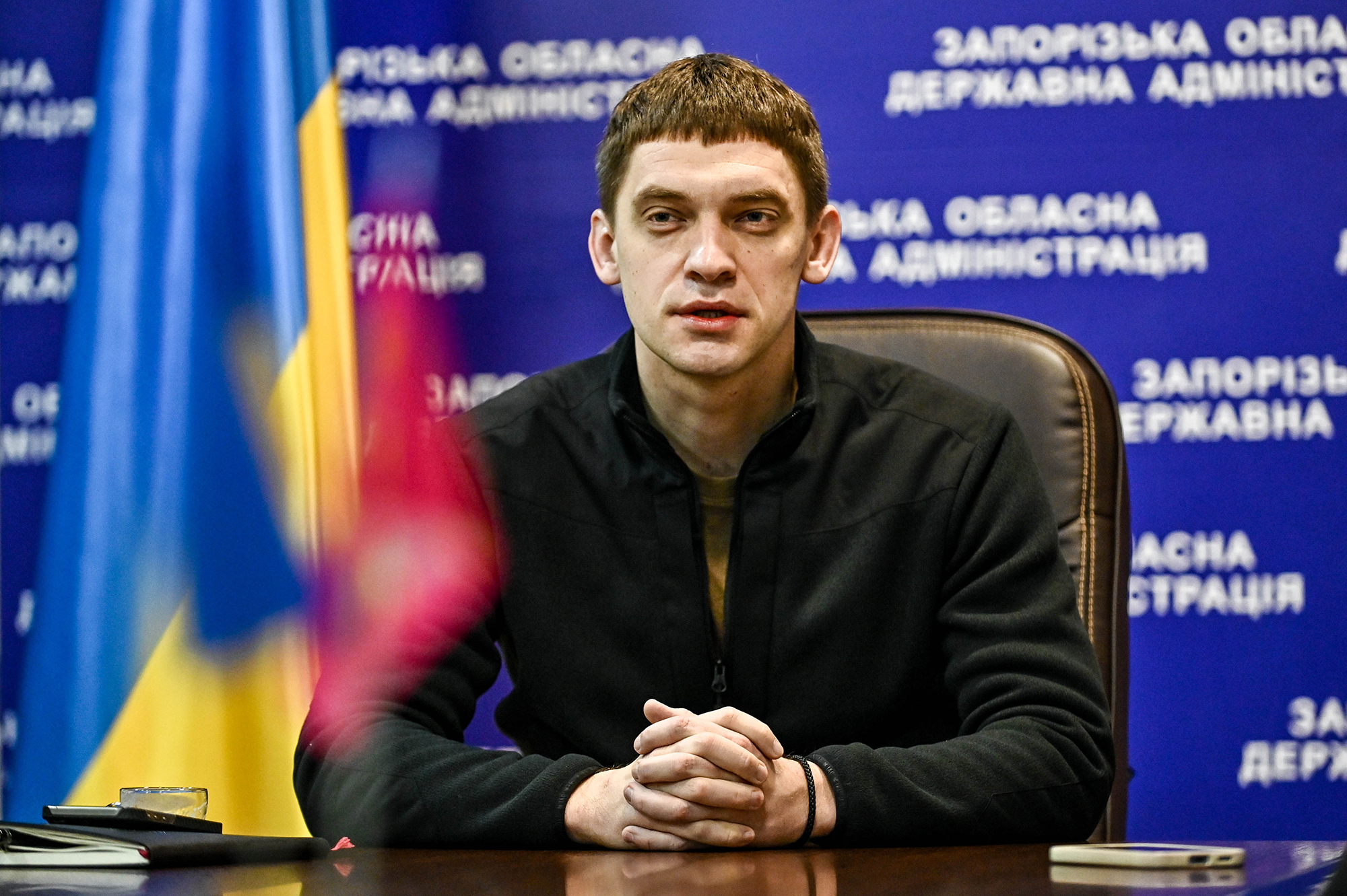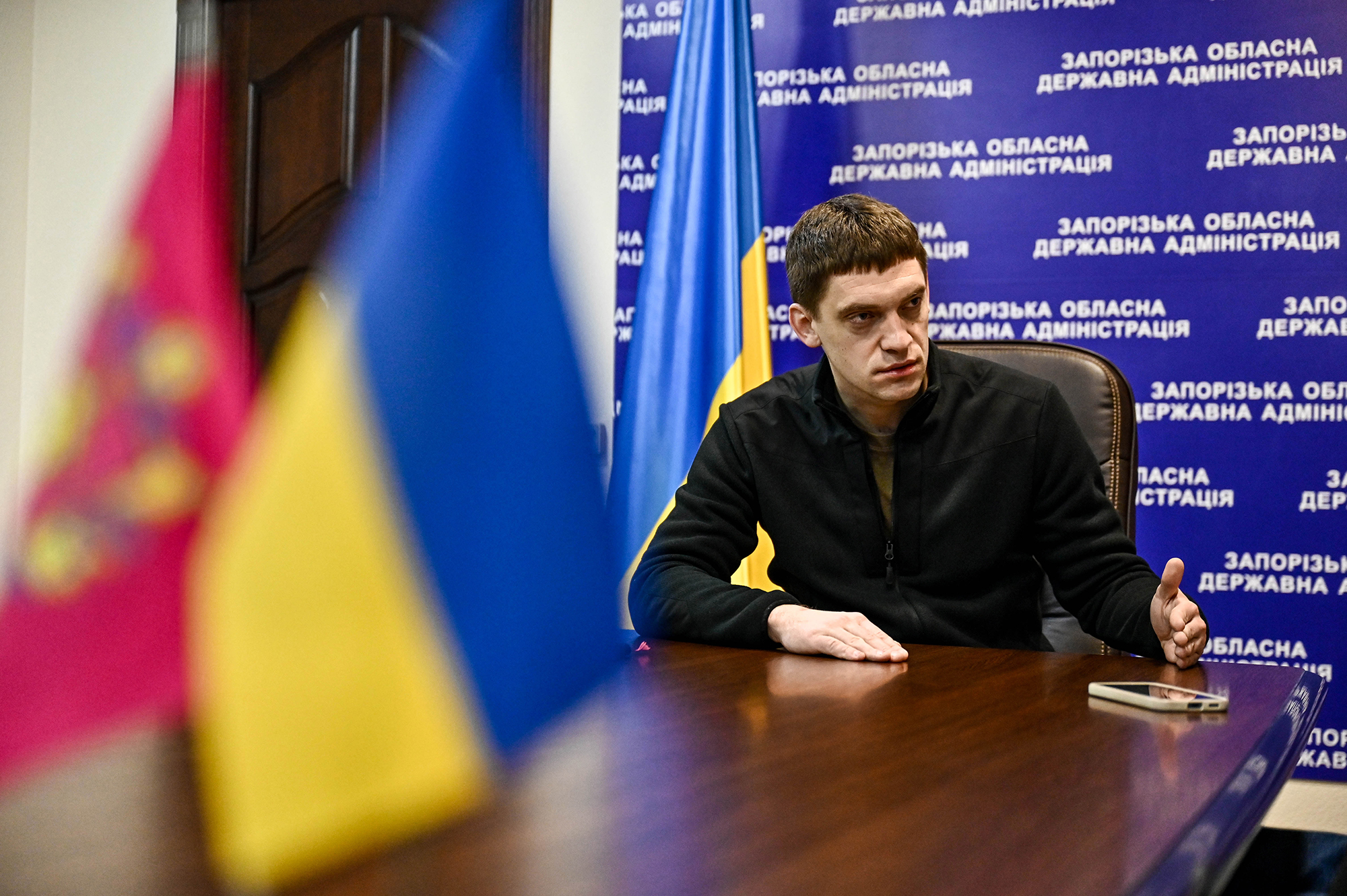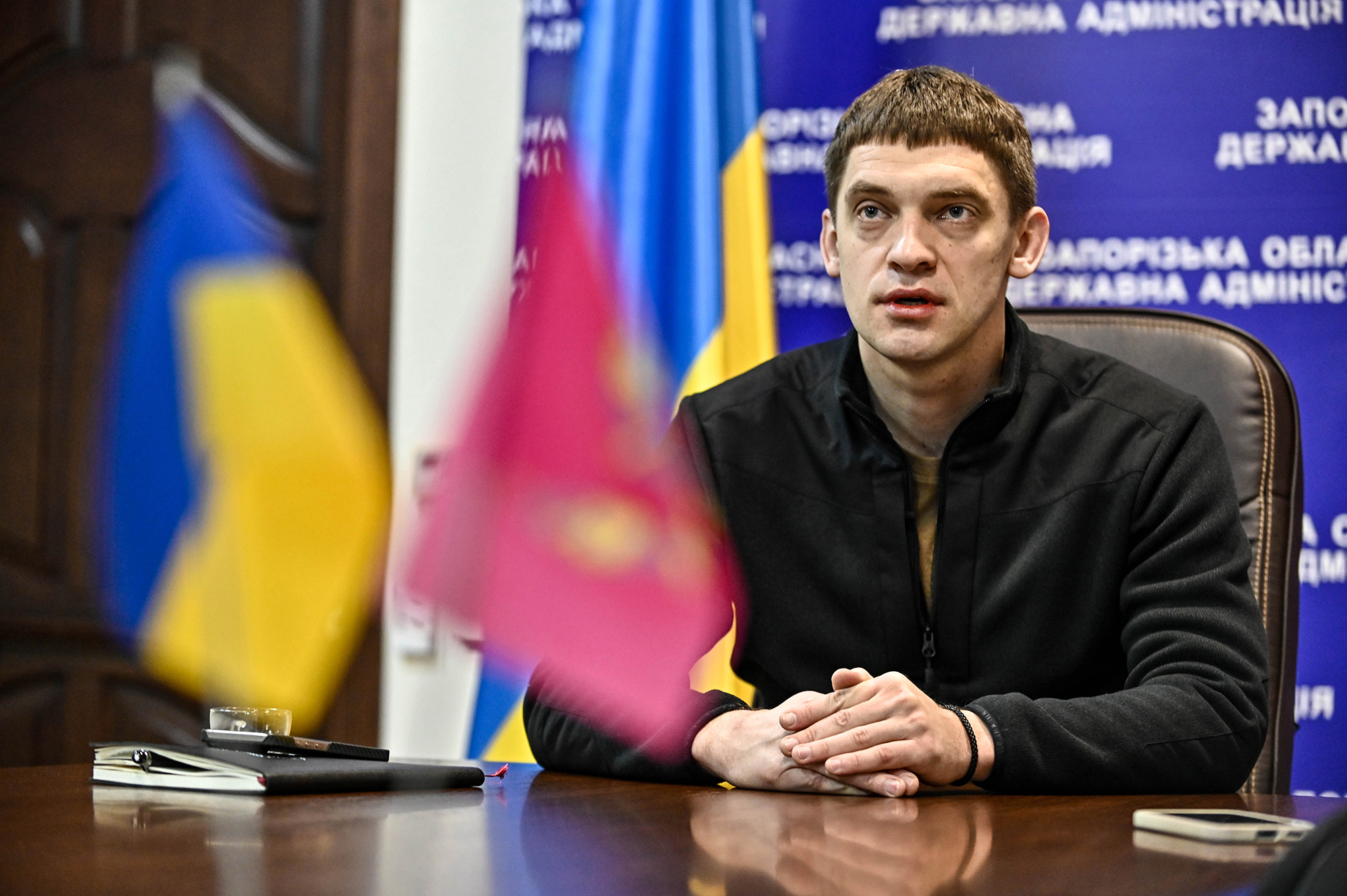'Putin's peace plan is the fantasy of a madman,' Ivan Fedorov, Zaporizhzhia governor
 Photo: Ivan Fedorov, Zaporizhzhia governor (Getty Images)
Photo: Ivan Fedorov, Zaporizhzhia governor (Getty Images)
How the residents of the frontline Zaporizhzhia live, what is happening in the occupied territories, and what the local authorities think about "Putin's peace plan" read in an interview of Zaporizhzhia region governor Ivan Fedorov with RBC-Ukraine.
Contents
- Operational situation in the Zaporizhzhia region and lack of air defense
- Occupied territories and "Putin's peace plan"
- Power outages and the situation in the region
The Zaporizhzhia region is more than 70% occupied by Russian invaders. One million residents of Zaporizhzhia live 30 km from the frontline, so any missile reaches the city in literally a minute, and the locals live under constant air raid alarms. Besides, the region, like other regions of Ukraine, regularly experiences power outages.
Nevertheless, the residents are not panicking. Fortification structures are being built in the region, and almost all communities have refused expenditures in favor of the defense budget. How the Zaporizhzhia region lives, what is happening in the occupied regions, and what the local authorities say about "Putin's peace plan," which includes Zaporizhzhia, was told in an interview of Zaporizhzhia region governor Ivan Fedorov with RBC-Ukraine.
Operational situation in the Zaporizhzhia region and lack of air defense
— What is the overall operational situation in the Zaporizhzhia region now?
— From time to time, the situation on the frontline escalates when the enemy, gathering certain groups of tens or hundreds, tries to storm positions on the frontline. On the other hand, they are trying to massively destroy our energy infrastructure, railroads, and overall infrastructure. This task has several goals: first of all, they are trying to sow discord in Zaporizhzhia and the region.
We all need to understand one simple thing – 1 million residents live 30 km from the frontline. Thirty kilometers – a million. And what does the enemy want to do? The enemy wants to sow panic among this million. That is why they target the energy sector, and that is why they target our infrastructure facilities. That is why there are air raid alerts in Zaporizhzhia for 5 hours a day. Thus, destabilization in the frontline city is the enemy's goal. It will definitely work to the enemy's advantage.
On the other hand, what is our operational situation? We live like the rest of our state. Business is working, production is working, not thanks to, but despite everything. And today, it continues in the same way, as much as possible, 30 km from the front.
— So they cannot achieve their strategic goal of sowing panic?
— I do not see panic in Zaporizhzhia. It does not exist. We understand that today the residents of the city go to shelters very little during alerts. This can be explained because if you sit in a shelter for 5 hours a day and sleep for 8 hours a day, you don't have any time left in your day. And of course, work, business activities, going to the market, or the store can all be interrupted by an air raid alert. Therefore, this is the situation today. But the residents have adapted. They have learned to navigate in an extremely difficult situation.
— We see that the region is being hit by almost everything, including ballistic missiles. Recently, President Volodymyr Zelenskyy said that the Zaporizhzhia region needs more protection. Is there an understanding of how to strengthen air defense?
— Dialogues on strengthening air defense are ongoing constantly, this is number one. We can do anything. Shelters, strengthening the frontline, shooting down enemy drones, and setting up electronic warfare (EW). All this is automatically on the agenda of our daily life. But this is only 10% or 20% of success.
If any missile takes 40-60 seconds to fly from the frontline to the center of Zaporizhzhia, we understand that we need ultra-modern air defense systems that will be able to detect and destroy them in the shortest time. Of course, we are not standing still. Today we see how our special services have learned to shoot down the so-called "eyes of the enemy". These are ZALA, Supercam, and other long-range surveillance drones. If they are shot down, the enemy cannot see in real-time and cannot make targeting, which significantly improves our situation.
This is being done today by our special services, we thank them, we cooperate and help with everything necessary. Of course, we are strengthening EW so that enemy missiles cannot fly to the assigned target. Of course, today there is cooperation with our critical infrastructure facilities regarding their protection – it concerns shelters, and camouflage of all military facilities and units, which are quite numerous in the Zaporizhzhia region.
We are doing all this, but it is not enough. The most important thing is still to push the enemy back, as they are at such a distance that it is very difficult for any defense system to cope.
— What general trends do you see? That is, the Russians are trying to storm the region with small mobile groups, expanding the frontline, and we are trying to stop them or push them back, right?
— The Russian troops have been trying to advance since May. With small or slightly larger groups, they are trying to advance. Do they have any real results in the Zaporizhzhia direction? No, they do not. Orikhiv, Hulyaipole, Stepnohirsk – these are the cities we control 100%, and the enemy does not control them. So they have no success. Today, our tactic is defense. Today we must do everything possible to ensure that enemy troops do not take our positions, and we are doing this. Therefore, I think there are no such extremely threatening trends today that could sow panic.

Ivan Fedorov (Photo: Getty Images)
Although I remember well – the end of April, the beginning of May, when under the pressure of the media, residents of Zaporizhzhia were driving their cars from the left bank to the right because it was said everywhere that the enemy was advancing, there would be a catastrophe, and so on. There is none of this.
— In the context of defense. When we had difficulties on the front in spring, we talked about fortifications. It turned out that they were not everywhere. What is happening in the Zaporizhzhia direction, especially since it is under the jurisdiction of the regional military administration?
— Including the regional military administration. This is under the jurisdiction of the military, and a separate part is performed by the regional military administrations. Thus, the regional military administration cannot determine where to build and how much. Fortification is a military task performed by two entities. The first is the military entity, and therefore, if we talk about the first and second line, this is purely a military task, performed with the support of the authorities. The third line is directly our task, which we perform at the request of the military.
What do we have? The first task of the military is completed. We are currently performing the second and third tasks. We are improving and upgrading. Why are we upgrading? Because the war is changing. If we look at the war on February 24, 2022, and today’s war, they are two different wars. That is why we must quickly modernize the fortifications we are building, which will protect not only from direct hits from tanks, armored vehicles, or artillery. This line of fortifications must also protect against drones that can fly into the trench and monitor our military, and for him, the trench is no longer a shelter, but a prison. Therefore, we do what we have to do.
I want to say that we are definitely not lagging, we are fulfilling all the tasks, improving, and doing this through the prism of making it comfortable for our military to serve in such bunkers and trenches.
Occupied territories and "Putin's peace plan"
— What is currently happening in the occupied territories? According to the latest information, the occupiers are intensifying mobilization, forcing Ukrainian men to join the Russian army and compelling them to take Russian passports. Based on your information, what is happening in the occupied territories of the Zaporizhzhia region?
— All the trends you mentioned are absolutely obvious. We understood that passportization would intensify. We understood that there would be mobilization. For example, why are they intensifying mobilization, besides the obvious reason? To prevent dissonance within Russian society. If propaganda claims that Russians are liberating, not occupying territory, then residents are supposed to be grateful to them. And if they are grateful, they should fight for this country, right? To liberate more. But now, mobilization is happening everywhere except the occupied regions, which creates dissonance. That's why mobilization is being intensified.
The enemy will continue to use our people as cannon fodder, and the only way to prevent this is to leave temporarily occupied territories while the opportunity still exists. And today, it does exist.
— So, there are still ways to leave the temporarily occupied territories?
— There is a possibility to leave, it's not a simple task, but such an opportunity exists. Also, we understand that communication with residents in occupation is very difficult today. Relatives cannot visit those in temporary occupation because entry to occupied territories only happens strictly through Sheremetyevo (Moscow airport), where there are constant filtration measures, and it's uncertain whether they will allow entry or not. It's known that only 10% are allowed entry. Why is that? I don't know. I can guess that counterintelligence measures are being intensified, and they don't want to let in anyone they aren't 100% sure of.
On the other hand, I would say that life in the temporarily occupied territory is like a military base where the enemy tries to establish its rules. This is what is happening now in the temporarily occupied territory.
— What new repressive instruments are occupiers using? Is propaganda intensifying?
— I can't talk about all the repressive instruments because this issue concerns people, and I don't want to harm anyone or help the enemy. As for propaganda, it's no longer about intensifying. In the occupied territories, it's just an endless stream. There is nothing left there where you can get objective information. So, you have to extract objective information, you have to search for it. Propaganda is everywhere, and people tend to believe information that is easily accessible rather than what needs to be obtained. It's not a problem; we all think like that.
Does the mood of people in the occupied territory change? Of course, it does. Many become disillusioned. Some people no longer believe their cities will be liberated from the occupiers. Unfortunately, such a mood exists; it would be wrong to say it doesn't. But should this affect our mood regarding liberation? Definitely not. Did the enemy ask for our mood when they entered our lands? No. So if someone starts a discussion saying 'we have already accepted it,' it won't affect anything. I don't care who accepted the situation as it is in my house. Absolutely not. So today, we must all be united around our state and sovereignty, around our military.
The focus of our attention is the liberation of our territory, the borders of 1991. This is the focus. Any compromise will lead to defeat. Any. There is no compromise where we win. There is none. And unfortunately, what I feel today not everyone understands. But we have no other way but to pass this through ourselves.
— By the way, regarding an uncompromising victory. Recently, before the Peace Summit, Russian dictator Vladimir Putin spoke about his 'peace plan,' which among other things includes recognizing our Zaporizhzhia region as part of the Russian Federation. We can observe such rhetoric, albeit very softened, among other countries that say negotiations may lead to certain territorial concessions. No one says it directly, but such an idea exists. What would you say in response to this?
— Look, President Zelenskyy's peace plan is not the plan of one person. As the Peace Summit in Switzerland showed, this peace plan, its points, and the discussion on peace on our terms were supported by 100+ states. 100+ states. So, this is a fundamental thing. This peace plan is not just ours; it belongs to us and our allies. 100+ civilized states of our world supported it. This is a fundamental thing.

Ivan Fedorov (Photo: Getty Images)
And we have Putin's 'peace plan.' Who supported it? Name one person. I don't know other people. It's not even about geopolitics here; no countries are saying, 'We stand with Putin for his peaceful plan.' These are his fantasies. The fantasies of a madman who says, 'Zaporizhzhia is mine.' Well, let him come to Zaporizhzhia, stand in the middle of the city, and say, 'This city is mine.' I just want to see what people will do to him. Zaporizhzhia will never be his, Melitopol will never be his, and other occupied territories will never be his property.
Our peaceful plan is the foundation. It's not about one person, Zelenskyy, and not just about the Ukrainian nation. It's about the entire civilized world treating it as a security ecosystem. 100+ states. And these are not second or third-rate states. These are the leading states of the world. Well, that means something. Often, people have moments when they mistake their desires for reality. So, looking at the situation differently, it might seem that we Ukrainians overestimate our capabilities, we do not soberly assess the objective situation, and we claim what is objectively impossible there. Could it be? Maybe. Expectations and reality - that's such a gap. But if our expectation is 100+ civilized states, this is no longer about illusions.
Power outages and the situation in the region
— What is the current situation with power outages in the region? How critical is it?
— The situation is challenging. But we are working on it. Ukraine is preparing for winter. Zaporizhzhia region is also preparing for the fall-winter period. We are negotiating with international partners. We can do a lot, but we need support. And we all understand its necessity – for the rapid recovery of Ukraine, protection of our people, civil and critical infrastructure.
— Recently, Ukrenergo (national power company - Ed.) suggested not cutting off power in the frontline regions. Do you think this idea is feasible? Have you discussed this?
— Right now, I'm here with you, and I'm on the phone negotiating with Ukrenergo on various issues. Let me explain. Is it possible? Maybe. Is it the right thing to do? In my opinion, yes, because people in areas close to conflict suffer more than those in western regions of Ukraine. It's about fairness as well. I don't have a biased view toward any of our citizens, but this is about fairness. We have about five hours of alert a day. What we have - big supermarkets don't work when there's an alert, they don't work when there's no power. So it's a lottery just to buy groceries. Therefore, this is the right idea.
As for how feasible it is, it's difficult for me to assess. I don't have the expertise to balance generation. It's clear that if we are given more, somewhere else will take more. Where they take more, will it become critical or not? I don't understand. For now, we are reducing our needs, we can calmly refuse during peak times and generate electricity.
— Air conditioners aren't turned on?
— If I say we don't turn them on, that would be untrue. If I say we always turn them on – that's not true either. Today, there's a clear directive for all administrative buildings. During peak times, we can switch to generation from installed generators. Why? So there is more power in apartments. Today, we have done a huge amount of work on critical infrastructure, we have cleaned up a large number of buildings and organizations from critical infrastructure. Because they are not critical infrastructure.
Today, we have a lot of work on a decentralized generation because you can live without power when it's warm, but when it's cold it will be almost impossible. So today, we have to prepare for winter, and this is a priority task with which we start and end the day.
— When Russians strike at the energy infrastructure, apart from their tactical and strategic tasks, they try to make life generally uncomfortable for Ukrainians, so that either we leave these places, that is, the territory becomes unsuitable for life, or become more compliant, let's say. Instead, what mood is prevailing in the Zaporizhzhia region?
— Several times a week I visit the frontline. I talk to the military, with the brigade leadership. When you talk to the military today, they have a clear understanding that many of them are fighting not only for the state but are also fighting for their comrade who is no longer alive. This is true. And it's personal. So in Zaporizhzhia, on Tsentralyi Avenue today, we cannot install prisms for all fallen Zaporizhzhians – small billboards – because their number exceeds the area of the avenue in front of the city council. It needs to be expanded, and today we are working on it, on the memorial.

Ivan Fedorov (Photo: Getty Images)
Why am I saying this? Zaporizhzhia has lost so much that there is no doubt what Zaporizhians are standing for. Are there traitors among Zaporizhians? Definitely. They are in any city, in any village. But everyone said that my hometown of Melitopol is pro-Russian. Only on February 24 in Melitopol, did three thousand residents come out with Ukrainian flags, and not a single person with Russian ones. There are no pro-Russian sentiments in Zaporizhzhia.
— It's not even about sentiments anymore, but about overall fatigue that the Russians want to exploit.
— Everyone is tired. But in the Zaporizhzhia region, we clearly understand our prospects. We have no other option. We either have the option of liberating the territory of Ukraine and the Zaporizhzhia region or there will be no Zaporizhzhia region in the future. We understand everything. There was Mariupol, and there was Melitopol, what happened to them over the years? They are no more. Mariupol was wiped off the face of the earth, and Melitopol was occupied. So that's the expectation for Zaporizhzhia. If we do not liberate these territories, sooner or later the enemy, without changing their plans, will seize Zaporizhzhia. That's why we understand that without light it's difficult, it's hard, we're tired, but everyone is thinking about the future.
— You recently said that the Zaporizhzhia community rejected expenditures in favor of the defense budget. How did this succeed?
— I really want to go home. Really want to go home. Our whole team really wants to go home. 200,000 residents who live in the territory of the Zaporizhzhia region today really want to go home. All of Ukraine wants an end to these daily horrors, alerts, and shelling. How can we, civilians, achieve this plan? The only way is to help the military. How can we help the military? Each in their place.
Someone treats wounded soldiers in military hospitals, someone teaches children in schools to support morale, and parents go to work at the factory during this time. Someone works at the plant producing for the military, someone bakes bread that is then consumed. This is mainstream.
In my understanding, the key to success, to victory lies in the harmony of cooperation between civilian and military administration. I have the phone numbers of all our brigade commanders in our direction in my phonebook. In case of anything, they all know they just have to send me a message, and their need is satisfied within a few hours. Because we cannot afford to lose anything, on the contrary, to gain. So today, with some brigade commanders and chief staff, we are working on how to improve our situation. We cannot meet all the needs of the military, but we can shoulder the burden for the rapid implementation of certain innovations so that the bureaucratic system works a little faster.
There are 2 billion 300 million in the defense fund of the Zaporizhzhia region. 98% of these purchases we make through Prozorro (electronic public procurement system - Ed.). Although we have the right to do without this system, because these are military purchases and urgent needs, but we must be transparent.
A few communities rejected our idea, most were for it. And some chose asphalt over a drone. We will tell you about it. And I am confident that even those roads they have made in the next electoral cycle will not bring them happiness.

